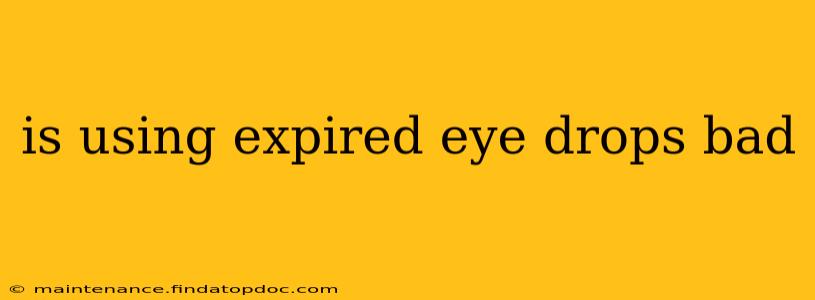Using expired eye drops might seem like a minor issue, but it can have serious consequences for your eye health. This comprehensive guide explores the risks, what to look for, and how to safely dispose of expired eye drops.
What Happens When Eye Drops Expire?
Eye drops, like any other medication, have a shelf life. Once they expire, their effectiveness decreases, meaning they may not treat your eye condition as intended. More importantly, the preservatives that keep the solution sterile start to break down. This can lead to bacterial or fungal contamination, significantly increasing the risk of eye infections. These infections can range from mild discomfort to severe vision problems, requiring extensive medical treatment.
What Are the Risks of Using Expired Eye Drops?
The risks associated with using expired eye drops are substantial and should not be taken lightly. Here's a breakdown of potential problems:
- Ineffective Treatment: Expired eye drops may not alleviate your eye condition, potentially worsening the problem and delaying proper treatment.
- Eye Infections: The most significant risk is the development of eye infections. Contaminated eye drops can introduce harmful bacteria and fungi directly into your eyes, leading to conditions like conjunctivitis (pink eye), keratitis (corneal infection), and even more serious complications.
- Allergic Reactions: The breakdown of preservatives can create new irritants, potentially triggering allergic reactions, leading to redness, itching, swelling, and discomfort.
- Vision Impairment: In severe cases, untreated or poorly treated eye infections from contaminated eye drops can cause permanent vision impairment or even blindness.
Can expired eye drops cause blindness?
While not a guaranteed outcome, severe eye infections resulting from using expired eye drops can lead to blindness if left untreated. The risk is significantly higher with contaminated solutions. This highlights the importance of always using fresh, unexpired eye drops.
How long are eye drops good for after opening?
The length of time eye drops remain safe after opening varies depending on the specific product and its preservatives. Always check the label for instructions on how long you can use them after opening. Typically, it's between 4 to 6 weeks, but this can differ. Discard any eye drops once that timeframe is reached, even if they appear to still be in good condition.
What should I do if I accidentally used expired eye drops?
If you've accidentally used expired eye drops, monitor your eyes closely for any signs of infection, such as redness, swelling, pain, increased tearing, or changes in vision. If you experience any of these symptoms, contact your doctor or ophthalmologist immediately. Prompt treatment is crucial to prevent serious complications.
How can I tell if my eye drops are expired?
Check the expiration date printed on the bottle. Beyond the expiration date, look for any changes in the solution's appearance, such as cloudiness, discoloration, or the presence of particles. A change in smell or texture is also a strong indication that the eye drops have gone bad. If you observe any of these changes, discard the eye drops immediately.
Proper Disposal of Expired Eye Drops
Never flush expired eye drops down the toilet. Instead, follow these steps for safe disposal:
- Check local regulations: Some communities have specific guidelines for disposing of medications.
- Follow the product instructions: The product label may have specific instructions for disposal.
- Mix with an undesirable substance: Mix the eye drops with an undesirable substance like used coffee grounds or kitty litter to make them less appealing for accidental ingestion.
- Seal tightly and discard: Place the mixture in a sealed container and dispose of it in the trash.
In conclusion, using expired eye drops carries significant risks to your eye health. Always check the expiration date, carefully inspect the solution, and discard any eye drops that are expired or show signs of contamination. Your eyesight is precious—protect it by using only fresh, unexpired medications.
